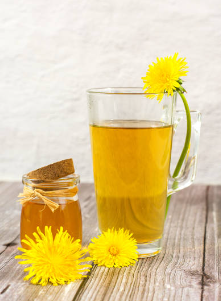Nature has provided us with a multitude of plants that possess incredible medicinal properties, and one such plant that often goes overlooked is the humble dandelion (Taraxacum officinale). Often dismissed as a mere weed, dandelion is a powerhouse of health benefits, offering numerous medicinal uses that have been recognized for centuries.
In this blog post, we will delve and explore the various medicinal uses of dandelion, as well as creative ways to incorporate it into our daily lives.
Table of Contents
Here Are Some of the Medicinal Uses of Dandelion:
1. Detoxification and Liver Support
Dandelion has long been revered for its ability to support liver health and aid in detoxification. The plant contains potent antioxidants and phytonutrients that help protect the liver from oxidative stress and promote the elimination of toxins from the body. Consuming dandelion tea or incorporating the leaves into salads can be an excellent way to reap these benefits.
Here’s how dandelion can help in detoxification and liver support:

- Antioxidant Activity: Dandelion is rich in antioxidants such as beta-carotene, flavonoids, and phenolic compounds. These antioxidants help neutralize harmful free radicals in the body, reducing oxidative stress on the liver. By protecting liver cells from damage, dandelion supports the organ’s overall detoxification function.
- Bile Production and Flow: The liver plays a crucial role in producing and secreting bile, a substance necessary for the digestion and absorption of fats. Dandelion has been found to stimulate the production and release of bile from the liver, aiding in the breakdown and elimination of dietary fats. This process promotes efficient digestion and helps the liver eliminate waste products effectively.
- Liver Regeneration: Dandelion contains compounds like sesquiterpene lactones and taraxasterol, which have been shown to promote liver cell regeneration. These compounds help protect liver tissue from damage and support the growth of new cells, enhancing the liver’s ability to heal and function optimally.
- Diuretic Properties: Dandelion acts as a natural diuretic, meaning it promotes urine production and increases the frequency of urination. This diuretic effect can aid in the elimination of toxins and waste products from the body, reducing the burden on the liver. By increasing urine output, dandelion helps flush out harmful substances, including excess salts, water, and metabolic byproducts.
- Anti-Inflammatory Effects: Chronic inflammation can contribute to liver damage and impair its detoxification processes. Dandelion possesses anti-inflammatory properties that can help reduce inflammation in the liver and protect it from injury. By mitigating inflammation, dandelion supports the liver’s overall health and function.
- Gallbladder Health: The gallbladder plays a vital role in storing and releasing bile produced by the liver. Dandelion has been traditionally used to support gallbladder health by promoting gallbladder contractions and preventing gallstone formation. By ensuring proper gallbladder function, dandelion indirectly supports liver health and enhances the overall detoxification process.
To incorporate dandelion into your detoxification and liver support routine, you can consume dandelion tea, capsules, tinctures, or incorporate fresh or dried dandelion leaves into your salads or smoothies. However, it is important to consult with a healthcare professional, especially if you have an existing liver condition or are taking medications, to ensure dandelion is suitable for your specific needs.
2. Digestive Health

Dandelion has traditionally been used to alleviate digestive ailments such as indigestion, bloating, and constipation. It acts as a natural diuretic, promoting urine production and reducing water retention. Dandelion root tea or tincture can stimulate digestive enzymes, enhance bile production, and improve overall gastrointestinal health.
Here’s how dandelion can help support and improve digestive function:
- Stimulation of Digestive Enzymes: Dandelion contains bitter compounds, such as taraxacin, that stimulate the production of digestive enzymes in the stomach. These enzymes play a crucial role in breaking down food particles, facilitating better digestion and nutrient absorption. By enhancing enzyme activity, dandelion can alleviate common digestive issues like indigestion, bloating, and gas.
- Improved Bile Flow: Bile, produced by the liver and stored in the gallbladder, aids in the digestion and absorption of fats. Dandelion has been shown to support the production and flow of bile, promoting better fat digestion. Efficient fat breakdown not only prevents discomfort but also enhances nutrient absorption, particularly fat-soluble vitamins like A, D, E, and K.
- Increased Appetite and Digestive Secretions: Dandelion has traditionally been used as an appetite stimulant and a digestive aid. It can increase both saliva and stomach acid production, which are essential for initiating the digestion process. By enhancing these digestive secretions, dandelion helps optimize the breakdown of food and the absorption of nutrients.
- Relief from Constipation: Dandelion acts as a gentle natural laxative, aiding in relieving constipation. The plant contains compounds called fructans, which have prebiotic effects. Prebiotics act as food for beneficial gut bacteria, promoting a healthy gut microbiome. A balanced microbiome is associated with regular bowel movements and overall digestive well-being.
- Soothing Inflammation: Inflammation in the digestive system can lead to discomfort and digestive disturbances. Dandelion possesses anti-inflammatory properties that can help soothe inflammation in the gastrointestinal tract. By reducing inflammation, dandelion may alleviate symptoms associated with conditions such as gastritis, acid reflux, and irritable bowel syndrome (IBS).
- Diuretic Effects: Dandelion’s diuretic properties can contribute to digestive health indirectly. By promoting increased urine production, dandelion helps eliminate excess fluid and reduce water retention. This can alleviate bloating and discomfort in the abdominal region, enhancing overall digestive comfort.
3. Anti-Inflammatory and Pain Relief
The anti-inflammatory properties of dandelion make it useful in managing various inflammatory conditions, including arthritis and joint pain. The plant contains compounds that inhibit inflammatory pathways, reducing pain and swelling. Applying dandelion oil topically or consuming dandelion supplements may provide relief from these ailments.
Here’s how dandelion serves as an anti-inflammatory and pain-relieving herb:
- Inhibition of Inflammatory Pathways: Dandelion contains bioactive compounds, such as flavonoids, polyphenols, and sesquiterpene lactones, which possess anti-inflammatory properties. These compounds can inhibit the activity of enzymes involved in the inflammatory response, such as cyclooxygenase (COX) and lipoxygenase (LOX), thus reducing inflammation and associated pain.
- Reduction of Pro-inflammatory Cytokines: Pro-inflammatory cytokines play a significant role in promoting inflammation and pain. Dandelion has been found to help modulate the production and release of these cytokines, such as tumor necrosis factor-alpha (TNF-α) and interleukins, by immune cells. By decreasing the levels of pro-inflammatory cytokines, dandelion helps mitigate inflammation and alleviate associated pain.
- Joint and Musculoskeletal Health: The anti-inflammatory properties of dandelion make it particularly beneficial for individuals suffering from joint pain, arthritis, and other musculoskeletal conditions. By reducing inflammation in the joints and tissues, dandelion can help alleviate pain, improve mobility, and enhance overall joint health.
- Antioxidant Activity: Chronic inflammation often leads to increased oxidative stress, which can further damage cells and tissues. Dandelion is rich in antioxidants that combat oxidative stress by neutralizing free radicals and protecting cells from damage. By reducing oxidative stress, dandelion helps prevent further inflammation and provides relief from associated pain.
- Topical Application for Pain Relief: Dandelion-infused oil or creams can be applied topically to areas experiencing pain and inflammation. Massaging the affected area with dandelion oil can help soothe sore muscles, reduce joint pain, and provide localized pain relief.
It’s important to note that while dandelion can offer pain relief and anti-inflammatory benefits, it may not be as potent as certain pharmaceutical medications for severe or chronic pain. However, it can be a valuable natural supplement or complementary approach to manage mild to moderate pain and inflammation.
As with any herbal remedy, it is advisable to consult with a healthcare professional, especially if you have an underlying health condition, are taking medications, or are pregnant or breastfeeding. They can provide personalized guidance on the appropriate use and dosage of dandelion for your specific needs.

4. Blood Sugar Regulation
Preliminary studies suggest that dandelion may help regulate blood sugar levels, making it potentially beneficial for individuals with diabetes or those at risk of developing the condition. The plant’s compounds can increase insulin sensitivity and promote glucose metabolism. However, it is essential to consult a healthcare professional before using dandelion as a supplement for blood sugar management.
Dandelion has shown promise in supporting blood sugar regulation, making it potentially beneficial for individuals with diabetes or those at risk of developing the condition.
Here’s how dandelion can help:
- Increased Insulin Sensitivity: Insulin resistance is a common characteristic of type 2 diabetes, where cells become less responsive to insulin, resulting in elevated blood sugar levels. Dandelion may help improve insulin sensitivity, allowing cells to effectively utilize glucose from the bloodstream. By enhancing insulin sensitivity, dandelion aids in better blood sugar control.
- Enhanced Glucose Metabolism: Dandelion contains bioactive compounds that can influence glucose metabolism in the body. Research suggests that these compounds can promote the uptake and utilization of glucose by cells, thereby helping to regulate blood sugar levels. This effect can be particularly beneficial for individuals with diabetes or those at risk of developing the condition.
- Inhibition of Alpha-Glucosidase: Dandelion has demonstrated inhibitory effects on alpha-glucosidase, an enzyme responsible for breaking down complex carbohydrates into simple sugars. By inhibiting this enzyme, dandelion can slow down the digestion and absorption of carbohydrates, preventing rapid spikes in blood sugar levels after meals.
- Antioxidant Protection: Oxidative stress plays a role in the development and progression of diabetes. Dandelion is rich in antioxidants that help combat oxidative stress by neutralizing free radicals. By reducing oxidative stress, dandelion supports overall metabolic health and contributes to better blood sugar regulation.
- Weight Management: Maintaining a healthy weight is crucial for blood sugar control. Dandelion may aid in weight management by promoting feelings of fullness and reducing food cravings. By supporting healthy weight management, dandelion indirectly contributes to better blood sugar control.
It’s important to note that while dandelion may have potential benefits for blood sugar regulation, it is not a substitute for medical treatment or prescribed medications for diabetes. If you have diabetes or are at risk of developing the condition, it’s essential to work with a healthcare professional to develop a comprehensive management plan that incorporates appropriate lifestyle modifications, dietary changes, and medications, as needed.
5. Skin Health
Dandelion possesses remarkable skin-healing properties. Its anti-inflammatory and antioxidant effects can soothe skin conditions such as acne, eczema, and psoriasis. Applying dandelion-infused creams or using dandelion root extract as a facial steam can promote a healthy complexion and improve the overall appearance of the skin.
Here’s how dandelion can help support and improve the health of your skin:
- Anti-Inflammatory Properties: Inflammation is a common underlying factor in many skin conditions, including acne, eczema, and psoriasis. Dandelion contains anti-inflammatory compounds that can help soothe and calm inflamed skin. By reducing inflammation, dandelion may help alleviate redness, swelling, and discomfort associated with various skin conditions.
- Antioxidant Protection: Dandelion is rich in antioxidants, including vitamins A, C, and E, and flavonoids. These antioxidants help combat oxidative stress caused by free radicals, which can contribute to premature aging and skin damage. By neutralizing free radicals, dandelion helps protect the skin from environmental stressors and promotes a healthy, youthful complexion.
- Acne Management: Dandelion’s anti-inflammatory and antioxidant properties can be particularly beneficial for individuals struggling with acne. The plant’s compounds may help reduce acne-related inflammation, soothe irritated skin, and inhibit the growth of acne-causing bacteria. Dandelion can also aid in the detoxification process, helping to eliminate toxins and impurities that can contribute to breakouts.
- Skin Detoxification: Dandelion supports the detoxification process, which can positively impact the health and appearance of the skin. By promoting liver function and aiding in the elimination of toxins from the body, dandelion indirectly contributes to clearer, healthier skin.
- Skin Nourishment and Hydration: Dandelion is rich in vitamins, minerals, and fatty acids that nourish and hydrate the skin. These nutrients help maintain the skin’s moisture barrier, keeping it supple and preventing dryness and flakiness. Dandelion-infused creams or oils can provide hydration and nourishment to the skin, promoting a smoother, more radiant complexion.
- Wound Healing: Dandelion has been traditionally used to support wound healing due to its antimicrobial and anti-inflammatory properties. It may help protect against infection, reduce inflammation, and promote the regeneration of healthy skin tissue, aiding in the healing process of minor cuts, scrapes, and bruises.
You can incorporate dandelion into your skincare routine through various methods, such as using dandelion-infused oils, creams, or incorporating dandelion extracts into DIY face masks or toners. However, it’s important to note that individual sensitivities and allergies can vary, so perform a patch test before using any new skincare product.
Creative Ways to Use Dandelion
- Dandelion Tea:
Steep dried dandelion leaves or roots in hot water to make a refreshing and healthful tea. You can enjoy it as is or add other herbs like chamomile or mint for additional flavors. - Dandelion Salads:
Add young dandelion leaves to your salads for a nutritional boost. The leaves have a slightly bitter taste, similar to arugula, and can be paired with citrus fruits, nuts, and a light dressing for a delicious and nutritious meal. - Dandelion Infused Oil:
Create a soothing oil by infusing dandelion flowers in a carrier oil, such as olive or coconut oil. This oil can be applied topically to reduce muscle soreness, alleviate skin irritations, or as a massage oil for relaxation. - Dandelion Pesto:
Blend dandelion leaves with garlic, pine nuts, Parmesan cheese, and olive oil to create a unique and nutritious pesto. Use it as a spread on sandwiches or as a topping for pasta dishes.
Conclusion
Dandelion, often underestimated and underappreciated, holds a plethora of medicinal uses and benefits. From its detoxifying properties to its ability to support liver health, aid digestion, reduce inflammation, regulate blood sugar, and promote skin wellness, dandelion deserves a place in our wellness routines.
You can also visit our Facebook and YouTube pages to know more about plants and their health benefits.
You might also like:








